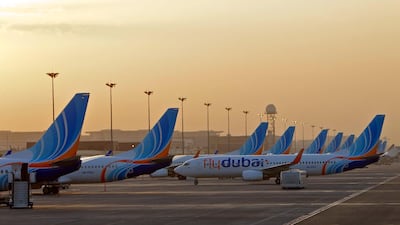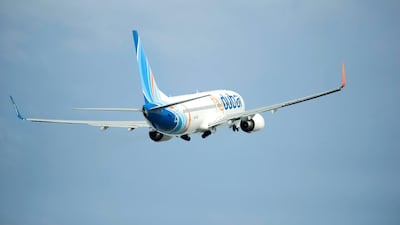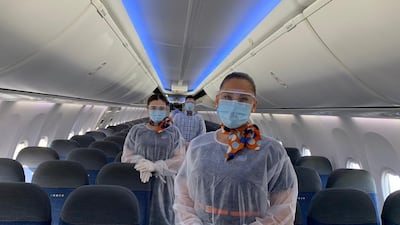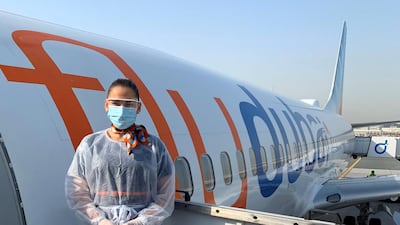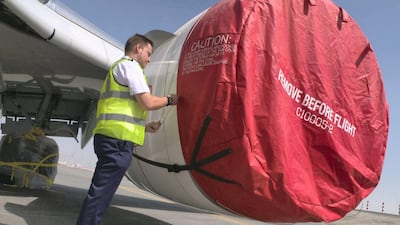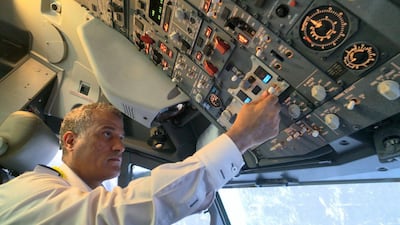Flydubai has asked staff furloughed during the Covid-19 pandemic last year to return to work from June amid rising optimism about a rebound in summer travel.
The airline wrote to affected workers last week and gave them “a schedule to start coming back", chief executive Ghaith Al Ghaith told aviation consultant John Strickland during an online session at the Arabian Travel Market conference on Tuesday.
"[These are] all the people who were on unpaid leave,” he said. “That was a huge satisfaction from our side that we can bring back people.”
The Covid-19 pandemic hit the aviation industry hard, forcing airlines around the world to preserve cash by grounding aircraft and laying off or furloughing employees.
Flydubai had offered its staff the option of either unpaid leave or redundancy. About 97 per cent of affected staff chose to go on unpaid leave, said Mr Al Ghaith.
“I understand part of it is because people have no other choice... but it was a commitment from the people that they wanted to stick with the airline and we stuck with them,” he said.
In its 2020 annual earnings report, flydubai said 1,092 of its 3,796 workers went on unpaid or voluntary leave. The airline's workforce shrank by 3.2 per cent last year, compared with the previous year, it said.
The state-owned airline worked with regulatory authorities and partners to support staff on unpaid leave, said Mr Al Ghaith.
It teamed up with banks to provide relief such as loan repayment holidays to its affected employees.
“We tried to work out some of their problems because ... for a lot of people who work for us, the UAE is their second home,” he said.
“The feedback we got during this terrible time of how people valued what we have done was so encouraging. That made us so proud that we can do even more. This is a very big exercise to build people’s loyalty to the brand.”
Flydubai is upbeat about this year’s summer travel period. Before flights to India, Pakistan and Nepal were halted, the airline had reached more than 65 per cent of its pre-crisis capacity, said Mr Al Ghaith.
“We are very optimistic that with the summer coming up, things ... will be even better,” he said, noting this would depend on the travel restrictions of other countries.
“The biggest question will be which countries will be open. We are open here and ready for business in the UAE and the airline is ready.”
The budget airline has already revealed new summer routes to tap into pent-up travel demand.
It said yesterday that it will start flying to the Greek islands of Santorini and Mykonos, Bodrum and Trabzon in Turkey, Naples in Italy and Salzburg in Austria in the next two months.
Flydubai is currently using 10 of its 14 Boeing 737 Max aircraft after the UAE aviation regulator approved the jet’s return to the skies in January.
“We have opened new destinations ... that probably we would have not flown to, but because these are opportunities presented to us [through the 737 Max’s return]. There will be more of these opportunities,” said Mr Al Ghaith.
He said there is “huge potential” to deepen its existing partnership with sister company Emirates.
“With Emirates, we have a huge opportunity to work together,” said Mr Al Ghaith.
The two Dubai government-owned airlines co-ordinated before the pandemic on “basic” elements such as code-sharing and schedules.
They also reduced layovers and moved flydubai flights closer to Emirates at Dubai International airport's Terminal 3.
This gave the airlines a “huge business opportunity and this will continue”, he said.
Emirates and flydubai will remain separate brands while forging closer ties, he said, echoing comments by Emirates airline president Tim Clark's this week.
“Right now, the objective is to work as two separate airlines but that does not mean we cannot grow together,” said Mr Al Ghaith. “There is huge potential.”
Boston%20Strangler
%3Cp%3E%3Cstrong%3EDirector%3A%3C%2Fstrong%3E%20Matt%20Ruskin%3Cbr%3E%3Cstrong%3EStarring%3A%20%3C%2Fstrong%3EKeira%20Knightley%2C%20Carrie%20Coon%2C%20Alessandro%20Nivola%3Cbr%3E%3Cstrong%3ERating%3A%3C%2Fstrong%3E%203%2F5%3Cbr%3E%3C%2Fp%3E%0A
The stats
Ship name: MSC Bellissima
Ship class: Meraviglia Class
Delivery date: February 27, 2019
Gross tonnage: 171,598 GT
Passenger capacity: 5,686
Crew members: 1,536
Number of cabins: 2,217
Length: 315.3 metres
Maximum speed: 22.7 knots (42kph)
UAE currency: the story behind the money in your pockets
Lexus LX700h specs
Engine: 3.4-litre twin-turbo V6 plus supplementary electric motor
Power: 464hp at 5,200rpm
Torque: 790Nm from 2,000-3,600rpm
Transmission: 10-speed auto
Fuel consumption: 11.7L/100km
On sale: Now
Price: From Dh590,000
TEST SQUADS
Bangladesh: Mushfiqur Rahim (captain), Tamim Iqbal, Soumya Sarkar, Imrul Kayes, Liton Das, Shakib Al Hasan, Mominul Haque, Nasir Hossain, Sabbir Rahman, Mehedi Hasan, Shafiul Islam, Taijul Islam, Mustafizur Rahman and Taskin Ahmed.
Australia: Steve Smith (captain), David Warner, Ashton Agar, Hilton Cartwright, Pat Cummins, Peter Handscomb, Matthew Wade, Josh Hazlewood, Usman Khawaja, Nathan Lyon, Glenn Maxwell, Matt Renshaw, Mitchell Swepson and Jackson Bird.
The%20specs
%3Cp%3E%3Cstrong%3EPowertrain%3A%20%3C%2Fstrong%3ESingle%20electric%20motor%0D%3Cbr%3E%3Cstrong%3EPower%3A%20%3C%2Fstrong%3E201hp%0D%3Cbr%3E%3Cstrong%3ETorque%3A%20%3C%2Fstrong%3E310Nm%0D%3Cbr%3E%3Cstrong%3ETransmission%3A%20%3C%2Fstrong%3ESingle-speed%20auto%0D%3Cbr%3E%3Cstrong%3EBattery%3A%20%3C%2Fstrong%3E53kWh%20lithium-ion%20battery%20pack%20(GS%20base%20model)%3B%2070kWh%20battery%20pack%20(GF)%0D%3Cbr%3E%3Cstrong%3ETouring%20range%3A%20%3C%2Fstrong%3E350km%20(GS)%3B%20480km%20(GF)%0D%3Cbr%3E%3Cstrong%3EPrice%3A%20%3C%2Fstrong%3EFrom%20Dh129%2C900%20(GS)%3B%20Dh149%2C000%20(GF)%0D%3Cbr%3E%3Cstrong%3EOn%20sale%3A%3C%2Fstrong%3E%20Now%3C%2Fp%3E%0A
The Bio
Favourite place in UAE: Al Rams pearling village
What one book should everyone read: Any book written before electricity was invented. When a writer willingly worked under candlelight, you know he/she had a real passion for their craft
Your favourite type of pearl: All of them. No pearl looks the same and each carries its own unique characteristics, like humans
Best time to swim in the sea: When there is enough light to see beneath the surface
UAE currency: the story behind the money in your pockets
COMPANY PROFILE
Initial investment: Undisclosed
Investment stage: Series A
Investors: Core42
Current number of staff: 47
Killing of Qassem Suleimani
Results
%3Cp%3E%3Cstrong%3EStage%203%3A%3C%2Fstrong%3E%3Cbr%3E1.%20Einer%20Rubio%20(COL)%20Movistar%20Team%20-%204h51%E2%80%9924%E2%80%9D%3Cbr%3E2.%20Remco%20Evenepoel%20(BEL)%20Soudal%20Quick-Step%20-%2014%22%3Cbr%3E3.%20Adam%20Yates%20(GBR)%20UAE%20Team%20Emirates%20-%2015%22%3Cbr%3E%3Cstrong%3EGeneral%20classifications%3A%3C%2Fstrong%3E%3Cbr%3E1.%20Remco%20Evenepoel%20(BEL)%20Soudal%20Quick-Step%3Cbr%3E2.%20Lucas%20Plapp%20(AUS)%20Ineos%20Grenaders)%20-%207%22%3Cbr%3E3.%20Pello%20Bilbao%20(ESP)%20Bahrain%20Victorious%20-%2011%22%3C%2Fp%3E%0A
Killing of Qassem Suleimani
The specs
Price: From Dh180,000 (estimate)
Engine: 2.0-litre turbocharged and supercharged in-line four-cylinder
Transmission: Eight-speed automatic
Power: 320hp @ 5,700rpm
Torque: 400Nm @ 2,200rpm
Fuel economy, combined: 9.7L / 100km
Our family matters legal consultant
Name: Hassan Mohsen Elhais
Position: legal consultant with Al Rowaad Advocates and Legal Consultants.
Company%20Profile
%3Cp%3E%3Cstrong%3EName%3A%3C%2Fstrong%3E%20HyveGeo%3Cbr%3E%3Cstrong%3EStarted%3A%3C%2Fstrong%3E%202023%3Cbr%3E%3Cstrong%3EFounders%3A%3C%2Fstrong%3E%20Abdulaziz%20bin%20Redha%2C%20Dr%20Samsurin%20Welch%2C%20Eva%20Morales%20and%20Dr%20Harjit%20Singh%3Cbr%3E%3Cstrong%3EBased%3A%20%3C%2Fstrong%3ECambridge%20and%20Dubai%3Cbr%3E%3Cstrong%3ENumber%20of%20employees%3A%3C%2Fstrong%3E%208%3Cbr%3E%3Cstrong%3EIndustry%3A%20%3C%2Fstrong%3ESustainability%20%26amp%3B%20Environment%3Cbr%3E%3Cstrong%3EFunding%3A%20%3C%2Fstrong%3E%24200%2C000%20plus%20undisclosed%20grant%3Cbr%3E%3Cstrong%3EInvestors%3A%20%3C%2Fstrong%3EVenture%20capital%20and%20government%3C%2Fp%3E%0A
The specs
Engine: 4.0-litre flat-six
Torque: 450Nm at 6,100rpm
Transmission: 7-speed PDK auto or 6-speed manual
Fuel economy, combined: 13.8L/100km
On sale: Available to order now
The specs
Engine: 5.2-litre V10
Power: 640hp at 8,000rpm
Torque: 565Nm at 6,500rpm
Transmission: 7-speed dual-clutch auto
Price: From Dh1 million
On sale: Q3 or Q4 2022
